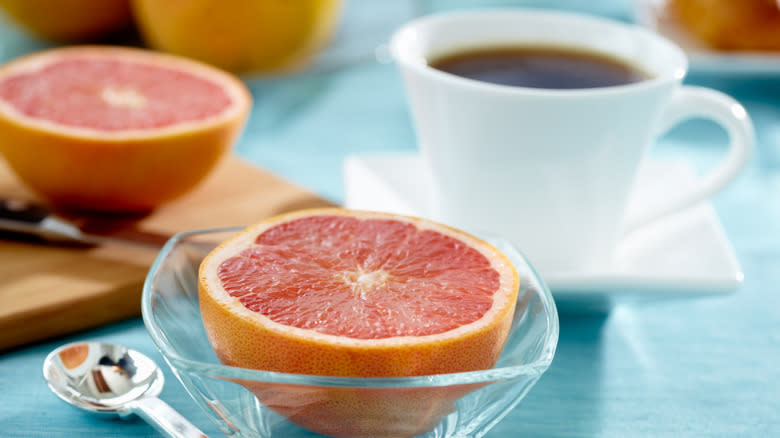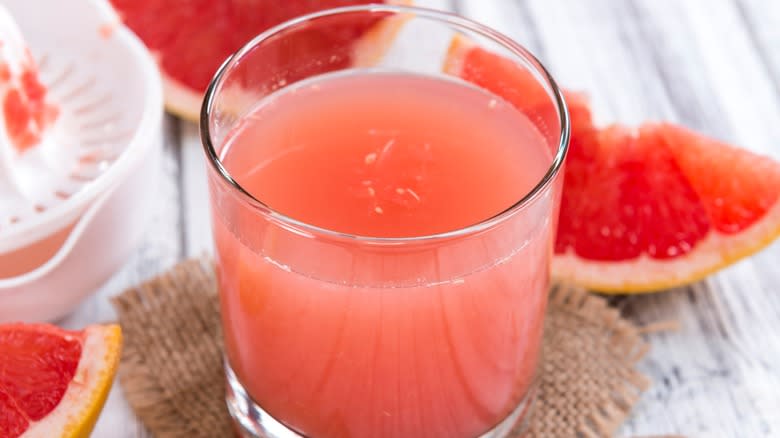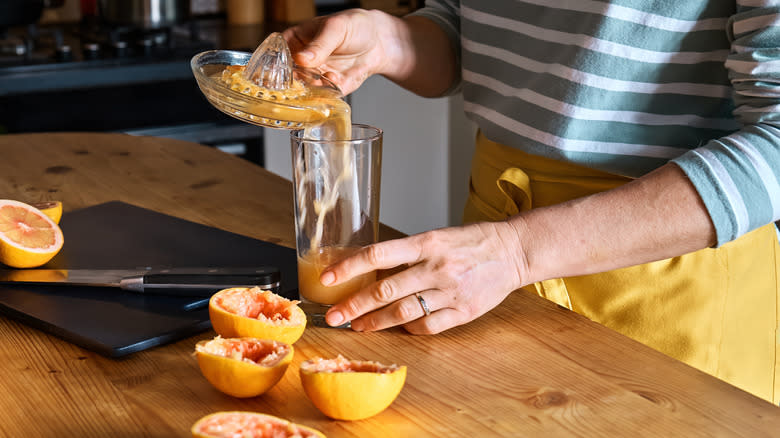The Grapefruit Coffee Hack That You Shouldn't Fall For

How do you like your coffee? Along with conventional add-ins like cream and sugar, some people really go out of the box when it comes to coffee enhancements. Take the butter coffee craze, which proponents claim can offset the negative effects of caffeine (beliefs that lack strong scientific backing). Similar claims surround the combination of grapefruit and coffee, as consuming the fruit alongside or adding its juice to coffee supposedly extends how long caffeine remains in your system thanks to a compound called naringin.
It's true that the naringin in grapefruit can affect certain medications and may even increase the potency of drugs due to its effect on metabolic processes. However, there's no real evidence that naringin increases the potency of coffee, as studies have found that the compound does not impact how long it takes for the body to metabolize caffeine. The authors of a 2006 study published in Clinical and Experimental Pharmacology & Physiology put it rather bluntly, stating, "Naringin does not alter caffeine pharmacokinetics, energy expenditure, or cardiovascular haemodynamics in humans following caffeine consumption."
Read more: The Absolute Best Energy Drinks, Ranked
Where Did The Grapefruit Coffee Idea Come From?

It should be noted that at least one scientific study (and a chemistry professor) did find that the naringin in grapefruit slowed down the rate of caffeine absorption, but the change was so insignificant that it did not alter metabolic processes. Based on these results, it's safe to assume that getting a more prolonged caffeine boost after drinking grapefruit juice with coffee can be categorized as a myth (similar to the claim that decaf coffee doesn't contain any caffeine). While it doesn't appear that the naringin-caffeine link is scientifically sound, the claim does seem reasonable when you consider grapefruit's effect on metabolic processes.
Naringin can inhibit a certain enzyme in the small intestine, which affects how some medications are processed. In some instances, this can result in a higher dose of medication making its way into the bloodstream, which can be hazardous to a person's health. Because of these concerns, people on antihistamines, heart medications, blood pressure drugs, and other medicines are often told to avoid grapefruit and grapefruit juices.
An Unlikely Combination Of Flavors That Somehow Works

While incorporating grapefruit juice into your morning coffee routine won't have much of an effect on your energy levels, the two flavors do work surprisingly well together. Adding grapefruit juice to espresso and sweetening the beverage with honey makes for a refreshing drink, particularly when the grapefruit juice is of the freshly squeezed variety. It's all about the balance of flavors, as the bright acidity of grapefruit serves as a nice contrast to the richness of the espresso.
When it comes to flavor profiles, coffee and grapefruit share a bitter quality that lots of people find pleasingly palatable (although keep in mind that eating bitter food could alter your judgment, according to a scientific study). If you're looking to tame some of the bitterness that results from pairing coffee and grapefruit, you can add things like vanilla syrup and club soda for a more well-rounded flavor profile. Just don't expect that your refreshing beverage will result in an extended caffeine rush.
Read the original article on Daily Meal


